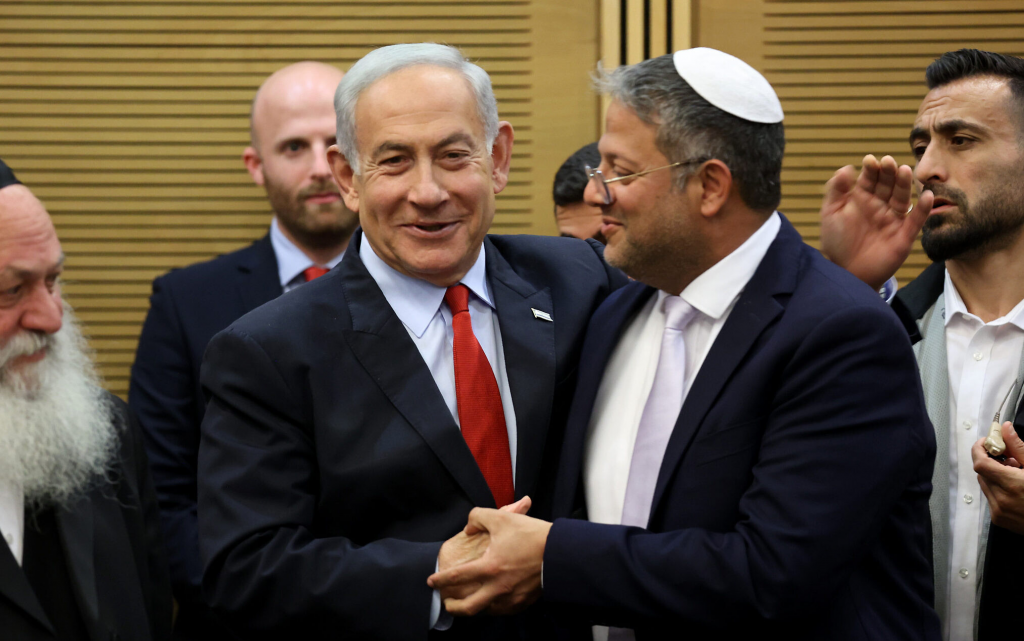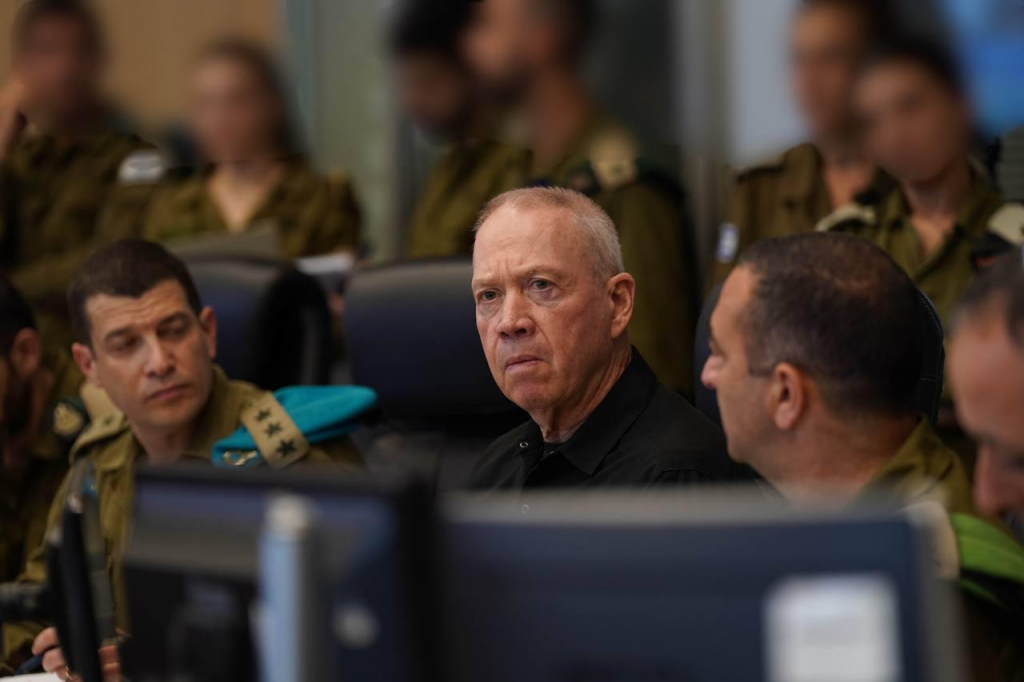PM insists status quo at flashpoint site remains unchanged after Ben Gvir says he’d support building a synagogue atop it; coalition, opposition members call for him to be fired

National Security Minister Itamar Ben Gvir sparked an uproar on Monday morning after he again declared that Jewish worshipers have the same rights as Muslim worshipers on the Temple Mount, and agreed that he would establish a synagogue atop the flashpoint site if he could.
The ultranationalist minister, who has made numerous controversial visits to the site since he entered the government, told Army Radio on Monday that Israeli law does not discriminate between the religious rights of Jews and Muslims at the Temple Mount, which is considered the holiest site in Judaism and the third-holiest in Islam.
“The policies on the Temple Mount allow prayer, period,” Ben Gvir said. “You are allowed to pray; it’s illegal to prevent you from praying.”
“Why should a Jew be afraid to pray?” he asked rhetorically. “Because Hamas will be angry?”
“The premier knows that when I joined the government, I said in the simplest way that there would be no discrimination at the Temple Mount, just like Muslims can pray at the Western Wall,” Ben Gvir added.
“It’s not like I do everything I want on Temple Mount,” he added. “If I did everything I wanted on Temple Mount, the Israeli flag would have long been flying there.”
Asked if he would put a synagogue on the site if he could, he answered, “Yes, yes, yes, yes.”

The interview followed an incident earlier this month when Jewish visitors to the site were filmed — including in the background of footage shared by Ben Gvir — praying and prostrating themselves, in violation of both police instructions and the unwritten status quo governing the compound, which is home to the Al-Aqsa Mosque.
A similar public prayer event was held at the Temple Mount on Sunday, which Ben Gvir did not appear to be involved in.
The worshipers were filmed prostrating themselves on the ground and praying out loud.
The status quo at the site allows Muslims to pray and enter the compound in Jerusalem’s Old City with few restrictions, while non-Muslims, including Jews, can visit only during limited time slots via a single gate, and are not supposed to pray.
Israeli security officials view violations of the status quo as having the potential to set off mass unrest, as the Temple Mount has been the scene of frequent clashes between Palestinian protesters and Israeli security forces, and tensions at the disputed compound have fueled past rounds of violence.
In response to Ben Gvir’s comments, Prime Minister Benjamin Netanyahu issued an oft-repeated statement insisting that there was “no change to the official status quo on the Temple Mount,” but avoided mentioning his ultranationalist coalition partner by name.

Ben Gvir’s comments sparked an immediate outpouring of anger from members of the coalition as well as the far-right minister’s political opponents.
Interior Minister Moshe Arbel called on Netanyahu to remove the minister from his post overseeing the Israel Police, and warned that the Otzma Yehudit leader’s “lack of thinking could be paid for in blood.”
Ben Gvir’s “irresponsible comments put into doubt Israel’s strategic alliances with Muslim states as part of an alliance against the evil Iranian axis,” he said.
Arbel hails from the Shas party, one of two ultra-Orthodox coalition factions that have blanched at Ben Gvir’s attempts to increase the Jewish presence on the Temple Mount. Many ultra-Orthodox follow longstanding rabbinic prohibitions on visiting the compound, revered by religious Jews as sacred ground due to it having been home to the two ancient Biblical Jewish temples.

Following Ben Gvir’s previous visit to the site — where he filmed Jewish worshipers prostrating themselves — Shas leader Aryeh Deri was widely reported to have met with Opposition Leader Yair Lapid for the first time in over a decade to discuss cooperating on a resolution that would affirm a 1967 ruling of Jewish law from the Chief Rabbinate, according to which Jews are forbidden from ascending the holy site.
Defense Minister Yoav Gallant, who has increasingly clashed with Ben Gvir in recent months over how Israel’s war with Hamas and the clashes with Hezbollah in the north should be conducted, accused the minister of endangering Israel with his comments.
Gallant did not directly call for Ben Gvir to be removed from his post, despite the far-right lawmaker’s attempt to engineer Gallant’s sacking last year. But he made plain that keeping the politician in power could come back to hurt Israel, and noted that undermining the status quo was “dangerous, unnecessary and reckless.”
“Ben Gvir’s actions endanger Israel’s national security and its international standing,” Gallant wrote on X. “The action the IDF took yesterday to thwart a Hezbollah attack strengthened Israel, Ben Gvir’s statements weaken it.”

In response, Ben Gvir accused Gallant of “bowing to Hamas and dragging the State of Israel into a reckless deal.”
“Gallant is also choosing to continue the destructive policy of defeatist notions against Hezbollah in the north,” he added on X, reiterating his demand for Israel to launch a “decisive war” against Hezbollah.
Also criticizing the Otzma Yehudit leader from within the coalition was Education Minister Yoav Kisch of Likud, who said that “any change in the status quo on the Temple Mount, particularly during wartime, should be carried out professionally in the cabinet along with an examination into all the meanings and ramifications.”
“Minister Ben Gvir’s irresponsible statement in the media on this issue is stupid and unnecessary populism,” Kisch added.

Across the aisle, Lapid and the heads of the opposition parties were quick to add their voices to the growing chorus of condemnation, although they focused mainly on Netanyahu and the rest of the coalition, whom they accused of enabling Ben Gvir and keeping him in a position of power.
“The whole region sees Netanyahu’s weakness against Ben Gvir,” Lapid wrote on X. “He can’t control the government even when it comes to a clear attempt to destabilize our national security.”
Benny Gantz, head of the opposition National Unity party, said he expects little from Netanyahu, “who allowed an irresponsible arsonist to bring us down into an abyss in exchange for political quiet.”
“But there are responsible parties in the government and coalition who are expected to do something,” added Gantz, a former war cabinet minister. “Condemnations and nice words won’t suffice here, and history will judge you for being part of this dangerous endeavor.”
As reported by The Times of Israel
